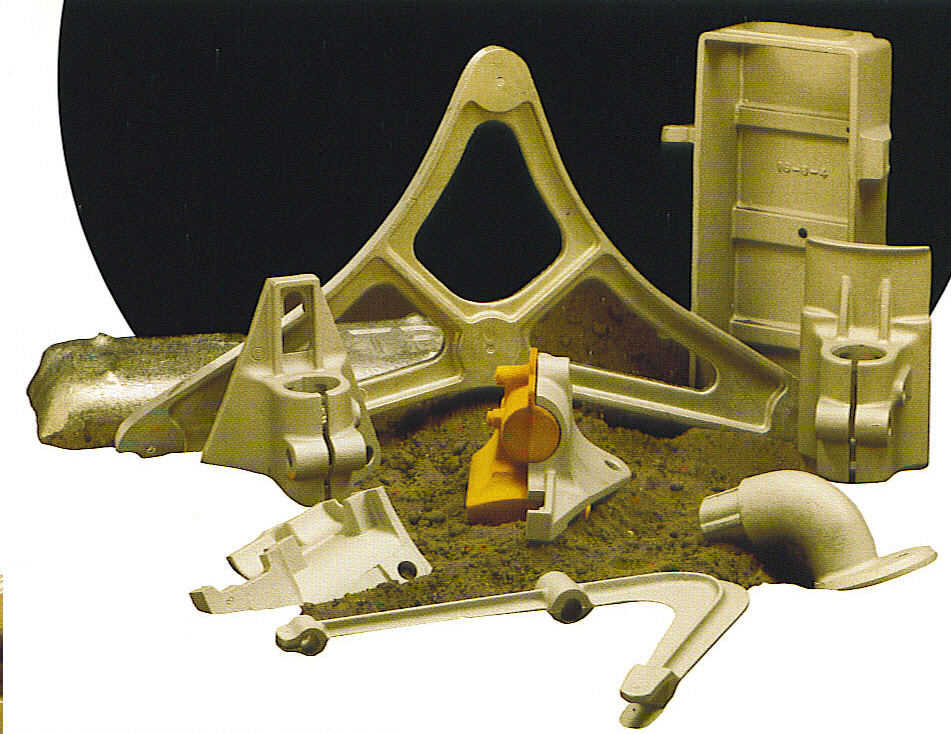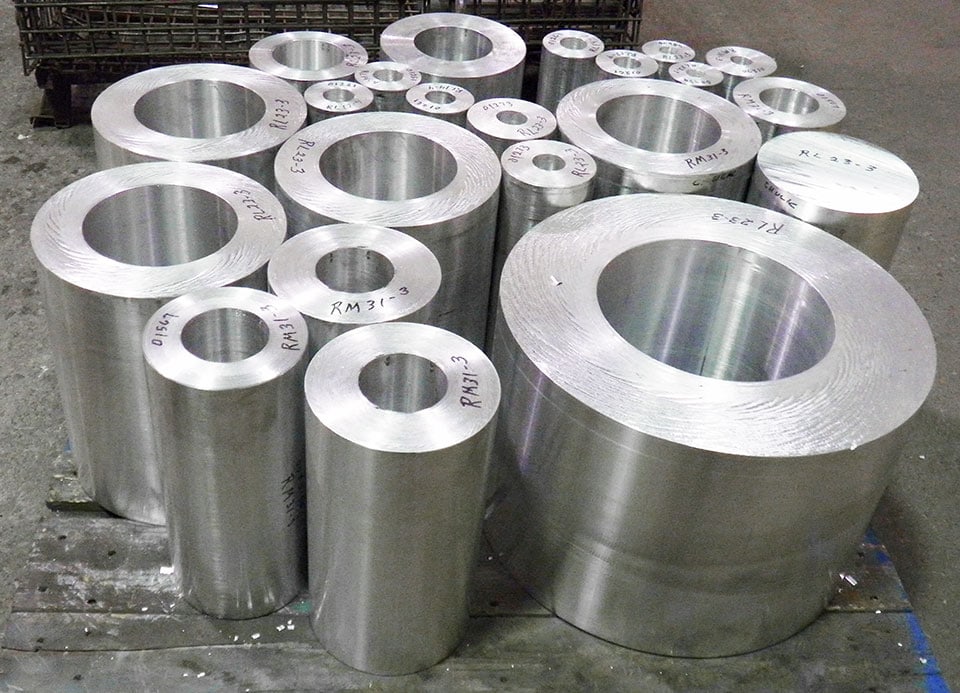How Metal Castings and Aluminum Foundry combine for superior quality
Finding the Essential Applications of Aluminum Castings Throughout Different Fields
Light weight aluminum spreadings play a necessary role in multiple industries. Their resilient and light-weight attributes contribute to advancements in auto and aerospace industries. In addition, they improve construction stability and customer item style. As sustainability comes to be a priority, the ecological advantages of aluminum castings additionally highlight their value. Comprehending the comprehensive applications of this material can expose insights right into modern-day production techniques. What certain developments are being made in these numerous industries?
Automotive Industry Innovations

Light weight aluminum spreadings play an important role in electrical vehicles, where weight decrease is extremely important for battery effectiveness. With the combination of aluminum in engine blocks, transmission real estates, and structural components, automakers can attain exceptional resilience while maintaining peak performance. As the need for reliable and lasting lorries grows, the automotive industry proceeds to welcome aluminum spreading technologies, positioning itself at the forefront of technical improvements and ecological responsibility.
Aerospace Advancements
While the aerospace market continuously looks for means to improve performance and effectiveness, improvements in aluminum castings have arised as a vital consider achieving these goals. The lightweight nature of light weight aluminum significantly adds to fuel effectiveness, minimizing overall aircraft weight without compromising structural integrity. Technologies in casting methods, such as die spreading and investment spreading, enable complex designs that improve the rules of aerodynamics and performance.
Developments in metallurgy have actually enhanced the stamina and deterioration resistance of aluminum alloys, making them suitable for numerous aerospace applications, including engine parts and body structures. The capability to create complicated forms lowers the variety of parts called for, streamlining setting up procedures and lessening maintenance demands. As aerospace manufacturers progressively turn to aluminum spreadings, they are locating that these innovations not only drive operational effectiveness but also support sustainability objectives with decreased power consumption throughout flight.
Building and construction Applications
Light weight aluminum castings play an essential function in the construction sector, supplying a combination of toughness, longevity, and light-weight residential properties that enhance structural honesty. Aluminum Castings. These spreadings are used in a range of applications, including window frames, door frameworks, and roof covering systems, where their resistance to rust and weathering is particularly helpful. Furthermore, light weight aluminum spreadings add to energy efficiency, as their lightweight nature minimizes the general tons on frameworks, facilitating easier transport and installation
Furthermore, the convenience of light weight aluminum permits complex geometries and intricate styles, conference aesthetic demands without jeopardizing architectural performance. In seismic areas, light weight aluminum spreadings can be utilized in crucial architectural elements, giving significant benefits concerning versatility and strength. Generally, making use of light weight aluminum spreadings in building not just enhances the efficiency of structures but also sustains sustainable building techniques by allowing the usage of recyclable materials in construction projects.

Customer Goods Production
In durable goods producing, aluminum castings play an essential role in lightweight product style, permitting much easier handling and improved performance. Their boosted durability features add to the longevity and reliability of day-to-day items. This combination of benefits makes light weight aluminum a preferred product in the affordable durable goods market.
Lightweight Product Layout
As producers progressively focus on effectiveness and sustainability, lightweight product design has actually emerged as an important facet of customer goods growth. The combination of aluminum castings permits designers to create products that are not only lighter yet also more energy-efficient. This reduction in weight adds to lower transportation prices and enhanced individual experience, as consumers increasingly seek easier-to-handle products. Furthermore, light-weight styles facilitate ingenious aesthetic appeals, allowing brand names to differentiate themselves in a competitive market. The flexibility of light weight aluminum allows for intricate forms and forms, enhancing general layout liberty. Light-weight item style is coming to be vital for business intending to satisfy modern-day consumer demands while sticking to ecological factors to consider. This pattern is improving how items are conceived and manufactured across various fields.
Improved Sturdiness Attributes
While modern customers require products that are both light-weight and aesthetically pleasing, enhanced sturdiness functions have ended up being just as necessary in consumer goods manufacturing. Light weight these details aluminum castings use outstanding strength-to-weight proportions, permitting producers to produce products that withstand everyday wear and tear. The fundamental corrosion resistance of light weight aluminum guarantees that items preserve their look and capability with time, decreasing the demand for regular replacements. In addition, casting techniques make it possible for the manufacturing of seamless designs that boost architectural stability. As a result, manufacturers can provide customer products that not just satisfy performance expectations but additionally offer long life. This concentrate on durability not only improves consumer fulfillment but also straightens with sustainability goals by minimizing waste and promoting liable usage.
Electrical and Electronics Market
The electrical and electronics market progressively depends on light weight aluminum spreadings for their light-weight, sturdy, and extremely conductive homes. These spreadings are important in manufacturing various parts, consisting of real estates, units, and heat sinks. Their reduced density enables decreased overall weight in digital tools, improving portability without endangering performance. Additionally, light weight aluminum's superb thermal conductivity is vital for dissipating heat generated by digital elements, making sure ideal working and longevity.
In addition, light weight aluminum castings supply excellent deterioration resistance, which is important for preserving digital integrity in numerous settings. The ability to create complicated forms and complex styles through spreading techniques better sustains technology in item advancement, permitting manufacturers to meet specific technical needs. As the need for high-performance and energy-efficient electronic devices remains to expand, light weight aluminum castings are placed as a key product, promoting innovations in modern technology throughout the field. Their flexibility and reliability make them crucial in the contemporary electrical and electronics landscape.
Sustainability and Environmental Impact
Recognizing the growing concern for ecological sustainability, the aluminum casting sector has made significant strides in reducing its ecological footprint. The production of light weight aluminum spreadings currently progressively utilizes recycled products, minimizing power intake and raw product extraction. This shift not only conserves sources but also lowers greenhouse gas emissions connected with primary aluminum production.
Furthermore, improvements in modern technology have caused extra efficient spreading processes, you can try this out even more lowering waste and boosting energy effectiveness. Several manufacturers are taking on sustainable techniques such as closed-loop systems that reuse water and minimize industrial waste.
Additionally, aluminum's light-weight nature enhances gas effectiveness in transportation industries, adding to lower discharges over the lifecycle of vehicles. As the industry remains to prioritize and innovate sustainability, light weight aluminum spreadings are poised to play an important duty in advertising ecologically liable practices throughout various industries, straightening with worldwide efforts to deal with environment modification and promote lasting growth.
Frequently Asked Concerns
What Are the Benefits of Aluminum Castings Over Various Other Materials?
Light weight aluminum spreadings provide lightweight properties, outstanding rust resistance, and great thermal conductivity. In addition, click over here now they allow complex styles, decrease manufacturing prices, and give improved longevity, making them beneficial contrasted to traditional products like steel or iron.
How Are Aluminum Castings Produced?
Light weight aluminum spreadings are produced through procedures like sand casting, pass away casting, and investment casting. Molten aluminum is poured into mold and mildews, allowed to cool, and after that eliminated, leading to precise and long lasting components for various applications.
What Is the Typical Lifespan of Aluminum Castings?
The common life-span of light weight aluminum castings ranges 10 to half a century, relying on environmental factors, usage conditions, and alloy make-up. Appropriate upkeep and treatment can considerably extend their toughness and efficiency in numerous applications.
Can Aluminum Castings Be Recycled?
Yes, aluminum castings can be recycled efficiently (Wisconsin Aluminum Foundry). The reusing process maintains the metal's residential properties, making it a lasting choice for different applications, as a result contributing to environmental conservation and resource management within numerous industries
What Industries Are Emerging for Light Weight Aluminum Spreading Applications?
Arising markets for aluminum spreading applications consist of electric lorry production, renewable resource industries, aerospace improvements, and clinical innovation. These sectors leverage light weight aluminum's lightweight, resilient residential properties to boost and introduce efficiency in various items and systems.
While the aerospace sector constantly looks for ways to improve efficiency and performance, improvements in aluminum castings have actually arised as an essential variable in attaining these objectives. Aluminum spreadings play a critical function in the construction industry, providing a mix of toughness, resilience, and lightweight residential or commercial properties that improve structural honesty. In customer products manufacturing, aluminum spreadings play a vital duty in lightweight product style, enabling for easier handling and boosted efficiency. The electrical and electronics market increasingly depends on aluminum spreadings for their lightweight, sturdy, and very conductive homes. Light weight aluminum spreadings are produced via procedures like sand spreading, pass away casting, and financial investment spreading.